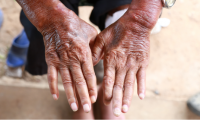-
FDA Clears IND for Kyverna Therapeutics’ Scleroderma Treatment
- Source: drugdu
- 111
- October 13, 2023
-
Study supports genetic predisposition to chronic regional pain syndrome in a third of cases
- Source: drugdu
- 236
- October 12, 2023
-
New University of Bristol study to aid strep A vaccine development
- Source: drugdu
- 128
- October 12, 2023
-
Salipro partners with Icosagen to develop monoclonal antibody therapies
- Source: drugdu
- 107
- October 12, 2023
-
Merck shares positive results for Keytruda in phase 3 bladder cancer study
- Source: drugdu
- 141
- October 11, 2023
-
Compound found to inhibit influenza virus replication by targeting host enzyme
- Source: drugdu
- 95
- October 11, 2023
-
Nanobiotix shares promising results for radiotherapy enhancer in advanced pancreatic cancer
- Source: drugdu
- 102
- October 9, 2023
-
Emergex and VIC to develop infectious disease therapies in the Gulf
- Source: drugdu
- 96
- October 9, 2023
-
FDA Authorizes Novavax’s Covid-19 Vax, Set to Join Fall Rollout of Updated Shots
- Source: drugdu
- 130
- October 4, 2023
-
Ariceum doses first patient with satoreotide
- Source: drugdu
- 206
- October 3, 2023
your submission has already been received.
OK
Subscribe
Please enter a valid Email address!
Submit
The most relevant industry news & insight will be sent to you every two weeks.













